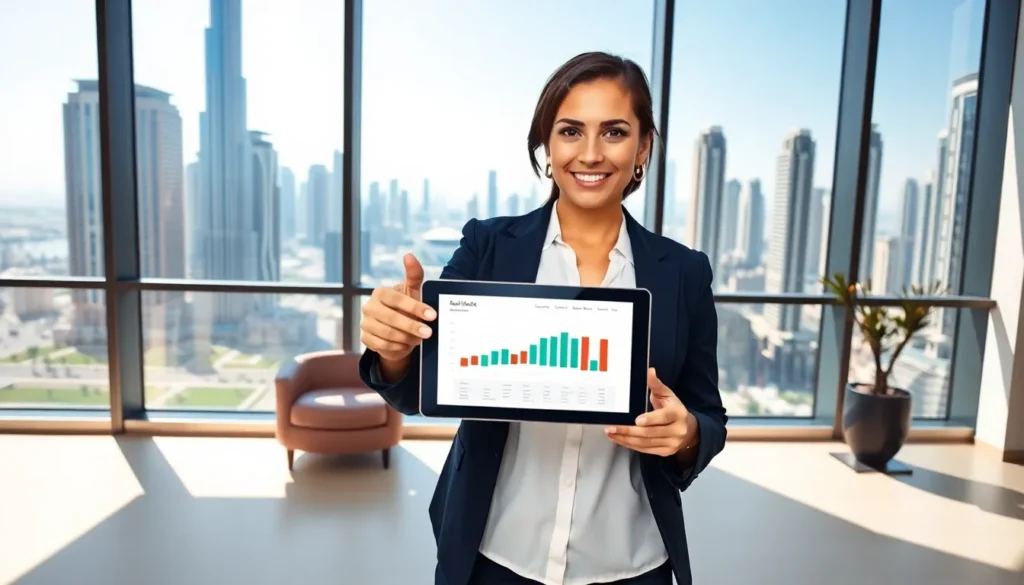Dubai is a city that dreams are made of, think glitzy skyscrapers, endless sunshine, and a lifestyle that’s a mix of luxury and adventure. Now, imagine capitalizing on this allure through real estate investment. Investing in Dubai real estate isn’t just a trendy choice: it’s becoming known as an intelligent financial move. With its booming market and numerous investment opportunities, it’s no wonder so many are considering making Dubai their next investment paradise. Whether you’re a seasoned investor or just dipping your toes into the property pool, this article covers everything you need to know to turn those dreams into bricks and mortar. So, strap in and get ready to navigate the dazzling Dubai real estate landscape.
Table of Contents
ToggleOverview Of The Dubai Real Estate Market

The Dubai real estate market is vibrant, dynamic, and attractive for both local and international investors. Over the last decade, this market has experienced explosive growth, significantly due to factors like infrastructure development, a booming economy, and a strategic location. It remains one of the top destinations for expatriates and investors alike, with property prices fluctuating based on economic shifts and international demand.
Dubai’s real estate sector is particularly appealing because of its diverse offerings. Luxury villas, modern apartments, and commercial properties cater to a wide range of preferences and budgets. Also, government policies favor foreign investment, making it easier for overseas buyers to navigate the market. Whether investing for personal use, rental income, or long-term appreciation, understanding current market trends is crucial.
Key Factors Driving Demand
Several key factors contribute to the ongoing demand for real estate in Dubai. First, the city’s strategic location acts as a bridge between East and West, serving as a pivotal hub for trade and tourism. This geographical advantage plays a significant role in attracting a steady influx of expatriates, businesses, and tourists.
The UAE’s commitment to large-scale infrastructure projects, like the expansion of the Dubai Metro and the construction of world-class airports, enhances the overall appeal of the market. Not to mention, the country continually upgrades its tourism offerings by hosting international events, making it a hot spot for travelers, and potential buyers.
Besides, the introduction of attractive policies, such as long-term visas for expats and tax incentives for investors, boosts confidence in the market. With continued investment in innovation, tourism, and luxury living, the demand for real estate is anticipated to rise.
Types Of Real Estate Investment Opportunities
Investors in Dubai have a wealth of options to explore when it comes to real estate. They can choose residential properties, commercial spaces, or even luxurious vacation homes.
Legal Considerations For Foreign Investors
Foreign investors should be aware of the legal framework surrounding property ownership in Dubai. Luckily, the UAE allows 100% foreign ownership in designated areas, making it relatively straightforward for non-residents to invest. But, it’s crucial to consult with legal professionals to understand the specific regulations and necessary documentation to ensure smooth transactions.
Financing Options For Real Estate Investments
Financing is another critical aspect to consider. Many banks in Dubai offer mortgage solutions tailored for expats, often with favorable terms. Due diligence is essential, as each bank may have different criteria. Successful investors often secure financing beforehand to streamline the purchasing process.
Strategies For Successful Investment
Developing a sound investment strategy is crucial for success in Dubai’s fast-paced real estate market. To start, investors should conduct thorough market research to identify up-and-coming neighborhoods with growth potential. Areas like Dubai Marina and Downtown Dubai are worth considering for high rental yields, while emerging locations like Dubai South may offer attractive long-term appreciation.
Networking with local agents and attending property expos can provide valuable insights and access to exclusive listings. Using data analytics tools can also help identify trends and forecast future demands. Finally, diversifying one’s portfolio by investing in different types of properties can mitigate risk and maximize returns.
Potential Risks And How To Mitigate Them
No investment is devoid of risks, and Dubai real estate is no exception. Price volatility can be influenced by external factors like geopolitical conditions or economic shifts. To counter these risks, investors should maintain realistic expectations about returns and be patient with their investments.
Another risk to consider is the fluctuating rental market. Conducting thorough due diligence on location and property type can help minimize this. Besides, ensuring comprehensive property management plans are in place can safeguard against unexpected expenses and tenant vacancies, offering peace of mind.
Market fluctuations are inherent in any investment, but awareness and strategic planning can make a significant difference.





